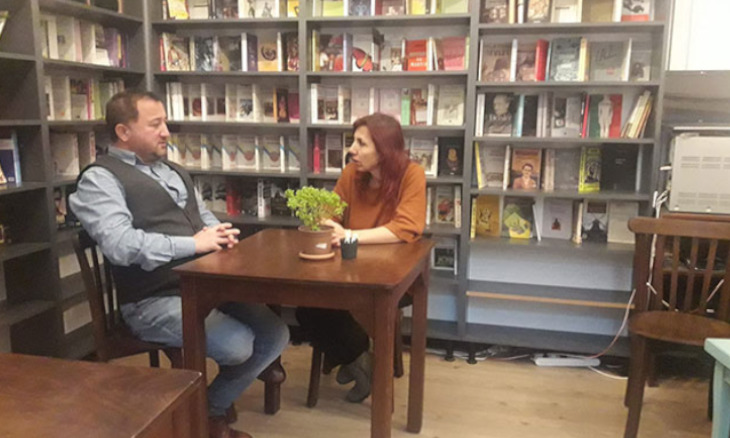Bergama Municipality employee to be fired in support of Istanbul Mayor Imamoğlu
Aydın İleri, who shared social posts concerning main opposition Republican People's Party (CHP) Istanbul Mayor Ekrem İmamoğlu while working as a librarian for the muncipality of Bergama, a district in the province of Izmir, was subjected to mobbing at his workplace and will not have his work contract renewed as of the end of this year.
Nuray Pehlivan/ DUVAR
Aydın İleri, who shared social posts concerning main opposition Republican People's Party (CHP) Istanbul Mayor Ekrem İmamoğlu while working as a librarian for the muncipality of Bergama, a district in the province of Izmir, was subjected to mobbing at his workplace and will not have his work contract renewed as of the end of this year. According to a notice issued to İleri, his contract is up as of Dec. 31, and he has been instructed to return any vehicle, instrument, item, or document in his possession belonging to the municipality.
İleri, who worked as a librarian for the Bergama Municipality since October 2016, continued his duties until the June 23 Istanbul repeat mayoral election. Following his return to Bergama after heading to Istanbul in support of İmamoğlu during that election, İleri was called into human resources and was told that he was being transferred to the archival department due to “making political and separatist posts [on social media].”
“The head of the human resources department said that I supported İmamoğlu's campaign, drove voters to Istanbul for free, and made separatist [social media] posts. He showed photos of a press statement we read at Bergama's main square in protest of the repeat of the Istanbul elections,” said İleri, adding that he was told that his social media posts were being followed and that there was pressure from above to remove him from his job.

Afterward, İleri was informed that he was transformed to the archive directorate, though no such directorate existed up until that point in the municipality.
“Due to my occupation and contract the only places where I can be sent to duty are libraries and archives. Prior to the notice I received on June 24, at a municipal meeting held in June they established a shell directorate. They presented it at city council saying 'we need to digitize this archive' and the proposal was accepted by all the council members from the CHP, [opposition right-wing] İP, [ruling Justice and Development Party] AKP, and the [far-right Nationalist Movement Party] MHP,” İleri said.
“Up until this point everything was normal! But if you are going to establish a directorate you first must prepare its underlying structure. There wasn't a director, or a headquarters. There weren't any staff or personnel. When you talk about a digital archive you need a scanning device, in order to transfer documents to a digital format you need hardware, you need an archive program and automation, internet and a computer. It was a typical Aziz Nesin story,” İleri said, referring to the late iconic Turkish satirical writer.
When İleri asked where his office was, they showed him a room in the basement floor of the municipality building that was full of cleaning materials. When he asked if they were sure, pointing out that this was not an office, he was told that it was in fact an office and that he was to work there. There was no ventilation system, no windows, and the place was full of toxic materials, according to İleri.
“If they really had the intention of establishing an archive I would have worked on it happily. A calendar in the room was dated to 2010. That is how abandoned this room was. I was forced to work in this storage room on the basement floor between June 25 and September 18,” said İleri, adding that during this period he filed five petitions insisting that he was the victim of mobbing and that this was a violation of his human rights.
During this period, İleri said that he still showed up for work every day, and that a number of civil society organizations and labor unions came to visit him and take his photograph amid the boxes of cleaning supplies. He was deprived of his annual vacation and couldn't spend time with his family, resulting in severe stress that ended up with him being prescribed anti-depressants.
İleri's stint in the basement ended following a visit from a health inspecting firm. He told the company that he had sent four petitions for the municipality to have them come and examine the conditions in which he was working. The inspectors entered the basement and were instantly struck by the smell, and told İleri: “Do not stay down here, you will get cancer.” One day after the inspection, İleri was called into the human resources department, where he was accused of “making a show” and “conducting politics”, though he was moved one floor up from the basement cleaning supply room.
“You might remember that in the Istanbul district of Güngören, one worker was sat in a chair in front of a toilet. For four months I sat in a chair like that in a place that smelled even worse than a toilet. They tried to demean my profession and humiliate. That was even more dishonorable. But I will be remembered in Bergama as a librarian who always did his job well. They fired me not because I didn't do my job but because of my opposition views. The only thing that makes me sad is my work that was left half finished,” İleri said, vowing to continue to resist and pursue legal channels.
